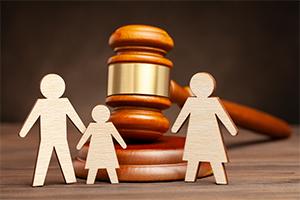of Experience
Joint Custody
Family Law Attorney Assisting Bergen County Residents

If you are going through a divorce and have unemancipated children, one issue that will need to be resolved is custody. One option for New Jersey parents is joint custody. Joint custody works best for parents who are able to work well together despite a divorce or separation, and it may help them retain a strong and positive family structure for their child or children. If you have questions or need advice in developing a joint custody plan, Bergen County child custody lawyer Howard B. Leopold at Leopold Law, LLC, can help. He proudly represents people throughout Northern New Jersey.
What is Joint Custody, and When is it the Right Arrangement?
As between parents, custody in New Jersey is classified as sole, shared, or joint. Sole refers to one parent having exclusive custody rights, although the other parent may have visitation rights. Shared custody refers to an arrangement in which both parents share custody, and joint custody is an arrangement in which the parents have roughly equal custody rights.
However, New Jersey residents should remember that there are also two types of custody—physical and legal. Physical custody refers to the physical location of the child, which involves whether a parent retains the right to live with the child. Legal custody refers to the right of a parent to make decisions on behalf of the child with respect to education, medical care, religious affiliation, extracurricular activities, and other major issues.
Consequently, it is necessary to understand which type of custody is sole, shared, or joint: physical or legal—or both. Under New Jersey law, it is possible for one parent to have sole physical and legal custody, for both parents to share both physical and legal custody, or for one parent to have sole custody of one type while having shared custody of the other type.
Sole physical and legal custody is rare, and it generally applies only when one parent is unfit, such as in cases of child abuse or neglect. Shared custody, in which the parents usually share both physical and legal custody, is common. Finally, there is joint custody. Shared custody is often known as “joint custody,” but “true” joint custody is when the parents’ rights to either physical or legal custody are virtually equal. It is most suitable when the parents have a relatively amicable relationship, and they are each willing to work with the other parent regarding all matters related to the child.
With respect to physical custody, a joint custody arrangement requires that the child spend roughly equal time with each parent. As a practical matter, this means that each parent must maintain a residence suitable for a family, and it also means that child support will be adjusted to account for the fact that each parent is expected to provide directly for the child’s needs (such as food, shelter, and clothing) rather than through the other parent. Like other custody plans, a joint physical custody arrangement requires the parents to spell out with specificity the days of the week, month, and year that the child will spend with each parent, including holidays, birthdays, and vacations, as well as how and when they will make transfers.
In many instances, joint custody applies only to legal custody. This means that, even in cases in which the child spends most of their time with one parent, both parents are fully involved in making important decisions regarding the child. Joint legal custody arrangements may be formulated in innumerable ways, but they will always require both parents to commit to investing time, effort, and patience in handling these matters. Even with good intentions and abundant good will, there are often differences of opinion. Consequently, the arrangement must spell out how disagreements will be resolved, and it may even specify whether one or the other parent will have the final determination with respect to specific issues.
Seek Guidance from a Bergen County Lawyer for a Child Custody Issue
Child custody issues are almost never simple to address. With the right help and advice, however, it is possible to develop a joint custody plan that is workable for both parents. For help with your custody matter, call Bergen County attorney Howard Leopold at (201) 345-5907 or reach us online to set up a free initial consultation. He can assist people who need a family law attorney in Paterson, Hackensack, Newark, Jersey City, and other communities in Passaic, Bergen, Essex, and Hudson Counties.




